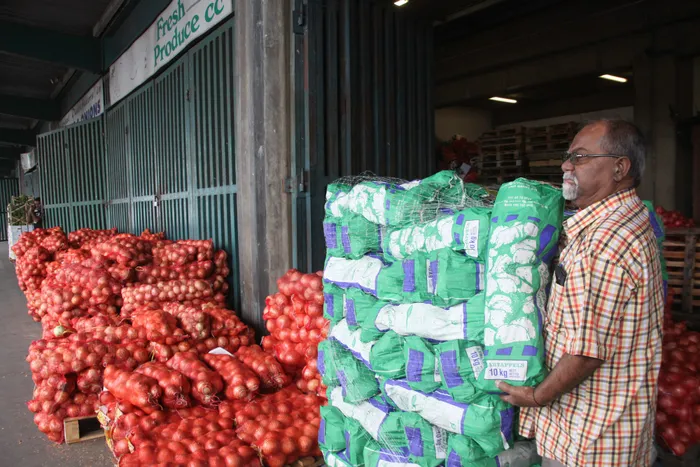Racial tension at Clairwood market

Racial tension is brewing between established Indian platform traders at the Clairwood Farmers’ Market and their black informal counterparts, who are allegedly demanding they stop business in the New Year or face a “blood bath”.
According to the chairman of the Platform Traders Association, Harry Ramlal, the informal traders are preparing to take over the area occupied by him and colleagues.
He said that last Wednesday and Thursday, informal traders using a public address system entered the market and instructed customers of the mostly Indian platform traders to stop purchasing from them.
Ramlal requested management intervene as the comments, he said, incited racial tension. He added that at a meeting a week earlier, which the market management chaired, informal traders threatened a blood bath if the platform traders failed to adhere to their instructions.
Ramlal said the informal traders also put up notices purporting to issue buyers’ cards to new customers. The notice read: “It is important that we all have these buyers’ cards since platform trading will no longer be allowed.”
But the chairman of the Durban Fresh Produce Market traders’ committee, Nico Magwaza, who is an informal trader, accused their detractors of fabricating propaganda.
He said although they were demanding platform traders cease operations by the end of January, they had never called for a blood bath but said mass action would be enforced, aimed at stopping all trading at the market.
Magwaza said the Indian platform traders were working in cahoots with salesmen and agents and this led to bribery and corruption. “There is a lot of corruption. For instance, we arrive at the same time at the market as the platform traders. When we try to buy a box of apples from the agent, we are told it has already been sold. How is this possible when we both arrived at the same time?”
He said they also felt there was an Indian price and an African price. “The Indian platform traders, often given priority over us, will buy a box of apples for one price, but we will be quoted another price for the same quality product.
“The Africans are also made to purchase rotten stuff from the agents. If you give us rotten stuff, who are we going to sell it to? It must either be given out for free or it must be thrown away. We are being exploited.”
Magwaza said another concern was secondary trading. “A man with a lot of money goes inside (to the agent section) and buys 10 boxes of bananas for, let’s say, R85 a box. When we arrive, we are told the bananas have been sold and if we want the fruit we must approach the buyer to sell it to us. But that person will increase the price.”
Magwaza said they wanted transformation at the market. “It is still in the hands of whites and Indians. We need to bring it to the hands of many.
“We have been trying to engage with the platform traders, agents and sellers, but they abandoned a meeting held by the market management. It was not acceptable.”
He said the platforms area was never meant for selling but was supposed to be used as a storage facility. “We feel that if the cages, where the platform traders operate from, are closed, our challenges will stop. There will be less bribery and corruption.
“We have given them until the end of January to move. If not, we will embark on mass action. That is the only way for the masses to express their views.
“We will organise people, wherever they are from in KZN, who use the Clairwood Market, to stop trading. No work will be done and no one will be allowed on the property.”
He said 5 000 to 6 000 informal traders used the market.
With regard to the alleged blood bath he said: “We will not do that. We are professionals. We went to school. We never used the word blood bath.”
He said the notice regarding the buyers’ card was merely to inform new customers that the Durban Fresh Produce Market traders’ committee was willing to assist them apply for the card, the information of which would be forwarded to the municipality, which would in turn issue the cards.
Ramlal, a trader at the market since its inception 39 years ago, said platform traders bought about 72% of all the produce sold at the market and the rest was sold to chain stores and the informal trade.
He said he attended the meeting Magwaza was referring to about two weeks ago, which was chaired by the market management. “They said that come January if they (platform traders) are still there, there will be a blood bath. Management just kept quiet. I told them the meeting was becoming too racialised and left.”
Regarding Indian and African prices, he said: “They are angry that when they come to the market, the produce is sold to the platform traders. We are here every day at 5am to see what produce is available and buy. Some informal traders come around 8am and expect to get the same produce.
“The market is based on supply, demand and negotiations. The platform traders have better negotiation skills and therefore they buy a little cheaper and in bulk.”
Ramlal said the informal trader frustration should be focused on the agents, who select to sell the goods to the platform traders. But he added that the agents sold produce on behalf of the farmers for the best price possible.
Ramlal said that there were about 50 platform traders currently operating.